2024 | Forum
Empathetic, Diverse and with Solidarity: the 2024 Forum
Between generations, between genres, between people – this year, the Forum once again invites you to journey to and beyond the borders of what is familiar in film. For the first time headed by Barbara Wurm, the section combines a diversity of genres with analytical cinema and provides a platform for those voices that are drowned out, derided or suppressed elsewhere. At times, the films tell their stories slowly, at other times they are action-packed; sometimes they sing and sometimes they remain silent.
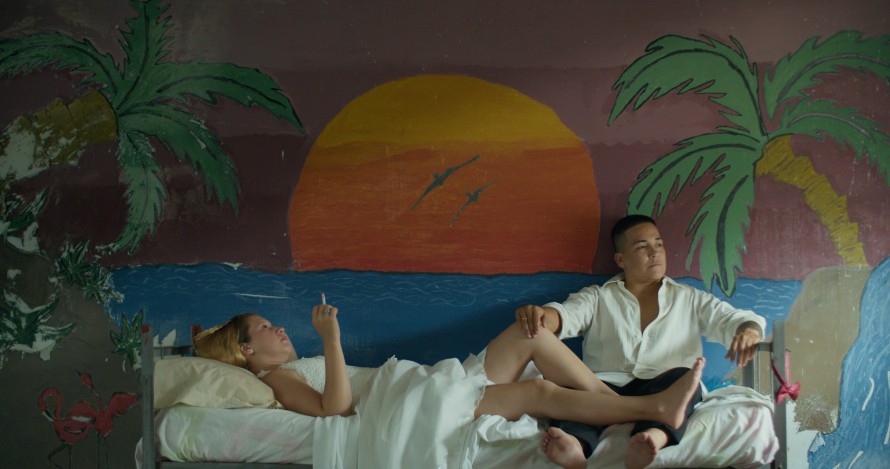
Yoseli Arias and Ignacio Amador Rodriguez in Reas by Lola Arias
You took over the management of the Forum last summer. What were you particularly looking forward to when you took up the position?
From the start, my joy was accompanied by a certain sense of awe. The Forum is a section that is rich in tradition. Before I took over, I spent four years on the selection committee of the Berlinale, so I already knew the festival. I was particularly looking forward to working directly with the team members of the Berlinale and the Arsenal.
Putting together the selection team was probably my biggest experiment for this edition. I felt it was important to represent different age groups and I wanted people to approach the films as openly as possible without immediately pigeonholing them into a festival category.
What changes are there in the up-coming edition?
The section is now more open to popular forms, although I still take films that have entertainment value seriously with regards to their aesthetics. That means that the programme may appear less homogeneous at first glance. A film like Reas by Lola Arias is both experimental and charming – a hybrid musical with unconventional elements whose story is nonetheless accessible.
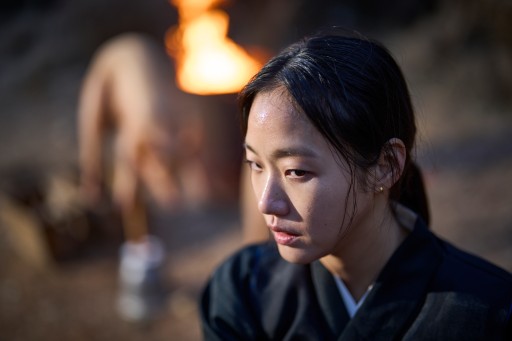
Kim Go-eun in Pa-myo by Jang Jae-hyun
The section sometimes has a reputation for being a bit unwieldy. Which Forum films would you recommend this year to people who are curious but who have had little experience of the Forum so far?
Pa-myo (Exhuma) from Korea is a typical genre film that could also be shown on Netflix – not least because it has stars including the Old Boy actor Choi Min-sik. There’s a great tradition of action films in the Forum which has previously had a run of genre cinema from Hong Kong, for example, by Johnnie To. Pa-myo has social, political and historical elements which makes it exciting. In terms of the story, it connects to the topic of exhumation which we internally referred to as “opening the boxes”. This is a subject matter that can also be found in other films in the programme.
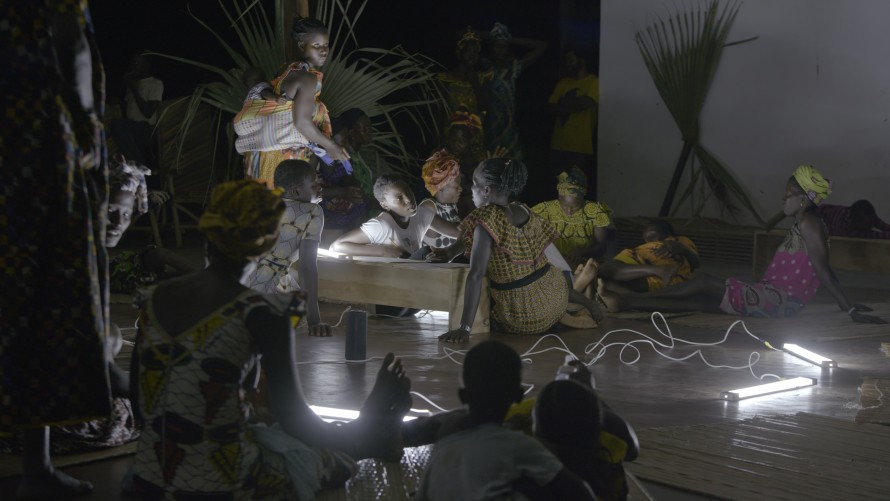
Resonance Spiral by Filipa César and Marinho de Pina
Which other films dig up things or open boxes?
Il cassetto segreto (The Secret Drawer) has an archival feel to it. It’s a cleverly edited film by the Sicilian director Costanza Quatriglio. She began filming her father – a famous journalist and photographer – when he was 90. The two open boxes together, including some that were previously secret. In Spuren von Bewegung vor dem Eis (Traces of Movement Before the Ice), René Frölke accompanies the heirs of Pendo, the Swiss publishing house. This is a film which experiments with media and contains images of shrink-wrapped books and rows of letters, but it also asks big questions: about the nature of the archive, about time capsules, about dealing with the past.
Resonance Spiral by Filipa César and Marinho de Pina portrays the Mediateca Onshore in Guinea-Bissau, where the archive becomes a meeting place. Or a true discovery, a film that we came across in the many submissions: L’homme-vertige (Tales of a City) by Malaury Eloi Paisley, an artist from Guadeloupe. For five years, she accompanied various people in Pointe-à-Pitre who are homeless or live in precarious circumstances. The film has moments in which these people’s faces suddenly appear in close up on the screen – like portrait photographs. It’s an empathetic way to film poverty.
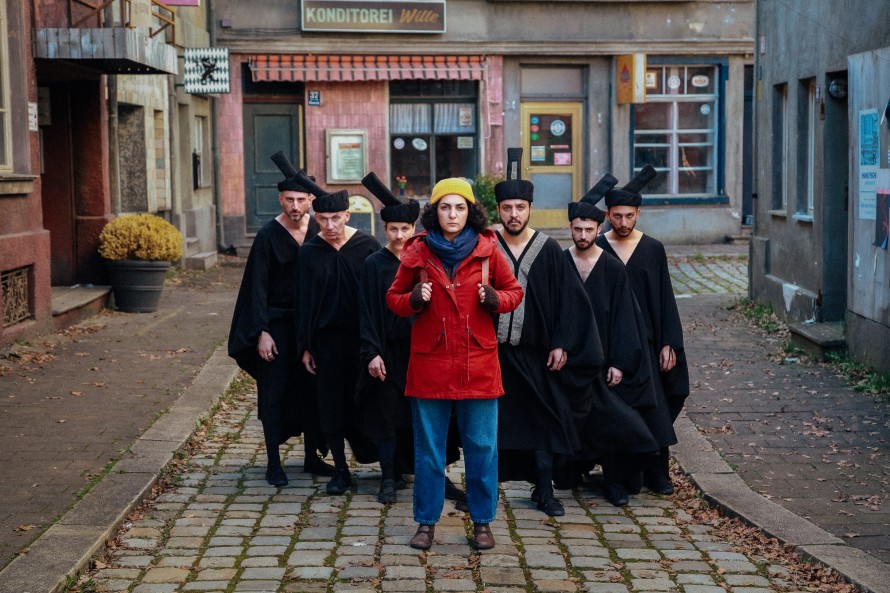
Baharak Abdolifard, Nima Nazarinia, Nina Wesemann, Zuki Izak Ringart, Alon Bracha, Ludger Lamers and Roman Singh in Shahid by Narges Kalhor
A theme of many Forum films this year is family – not the classic nuclear family, but as a relationship between generations. Was this a trend in the submitted films?
This year, we came across transgenerational relationships and alternative communities right from the start. When it comes to the topic of “alternative communities,” the Chinese documentary Republic by Jin Jiang is worth a mention. This is a typical underground film, quite anarchic. The protagonists create an alternative world in which they can take refuge.
As for transgenerational relationships, that topic does indeed run through our selection. The documentary Reproduktion by Katharina Pethke, for example, examines the (in)compatibility of motherhood with an artistic career across three generations of women in Germany. The starting point is the building complex that houses both the Hamburg Art School and the Maternity Clinic and which connects Pethke herself with her mother and grandmother.
In addition, we have two (post)migrant projects in the programme by German-Iranian filmmakers who deal with this transgenerational topic in their own way. Shahid by Narges Kalhor takes a daring, ambiguous approach in an autofictional film that explores the burden of a patriarchal legacy. In Was hast du gestern geträumt, Parajanov? (What Did You Dream Last Night, Parajanov?), it’s intriguing to see how the director Faraz Fesharaki interweaves VHS footage from his kindergarten days in Iran with the video material he’s collected from his virtual family reunions over ten years. It is becoming increasingly difficult to separate archive material, footage and found footage.
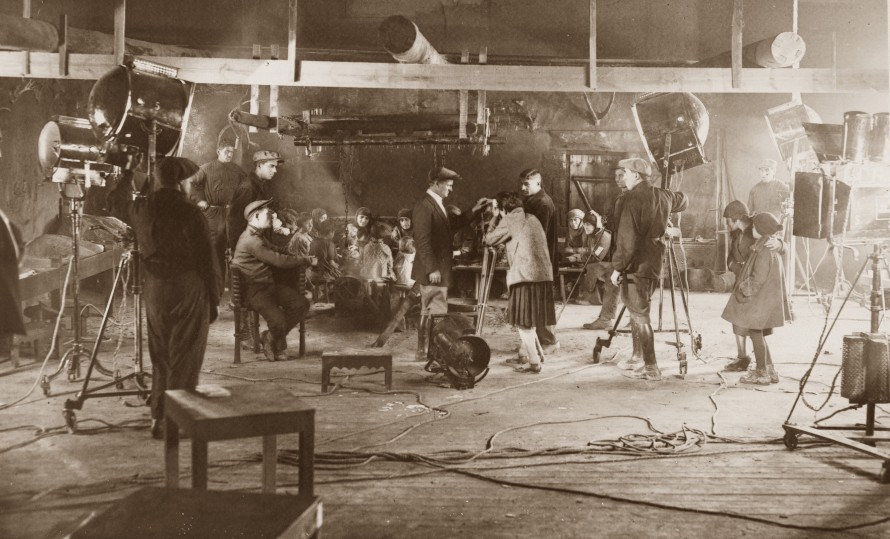
Deda-Shvili an rame ar aris arasodes bolomde bneli by Lana Gogoberidze
In Voices of the Silenced, the directors themselves also appear in front of the camera.
We’re screening Voices of the Silenced in the Forum Special together with Deda-Shvili on rame aris arasodes bolomde bneli (Mother and Daughter, or the Night is Never Complete). Both films are about mothers and daughters who are filmmakers and reflect on their own work. Nevertheless, the films are quite different. Mother and Daughter is by Lana Gogoberidze, a well-known Georgian filmmaker who already rose to international prominence in Soviet times and whose work screened at all the film festivals. Later on, she even served as Minister of Culture and she continues to be one of the most important cultural voices in her country. Park Soo-nam, on the other hand, comes from a humble background and, at the age of 50, decided to film the people around her. Her work reveals the ignored and suppressed history of the Korean population in Japan. It’s a bold, decolonial project. Neither film is shrieking or angry. Instead, they are empathetic, quiet and full of solidarity.
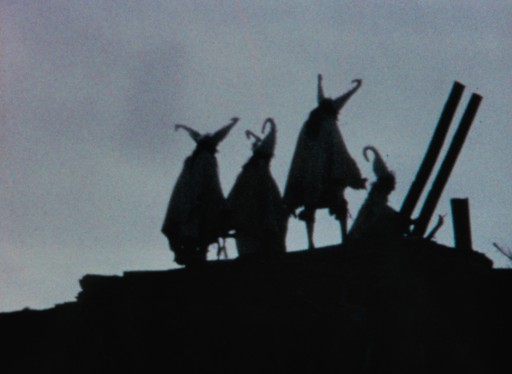
Techqua Ikachi, Land – mein Leben by Anka Schmid, Agnes Barmettler, James Danaqyumptewa
In addition to the works by Lana Gogoberidze and Park Soo-nam, which other films are you showing in the Forum Special?
We’re showing Diese Tage in Terezín (Those Days in Terezín) by Sibylle Schönemann, a film which also fits in well with the topic of resistance and transgenerational relationships. It was first presented in the Forum back in 1997 and we’re pleased to be able to screen this important film in a 35 mm print. We are also screening Techqua Ikachi, Land – mein Leben (Techqua Ikachi, Land – My Life) from 1989. The Arsenal has digitally restored this film which is another archival work. It integrates the Super-8 recordings of Hopi James Danaqyumtewa into the film, thus preserving the archive material and the art, memory and culture of the Hopi people while at the same time keeping it alive.
In addition, we’re holding a special screening of Kaddu Beykat to mark the first anniversary of the death of Senegalese director Safi Faye, whose films previously featured in the Forum. On February 22, we’re organising a memorial evening for her with the HKW, attended by Safi Faye’s daughter Zeïba Monod and the filmmaker Raoul Peck. He has taken on Safi Faye’s work and I’m really pleased that he will be at the event.
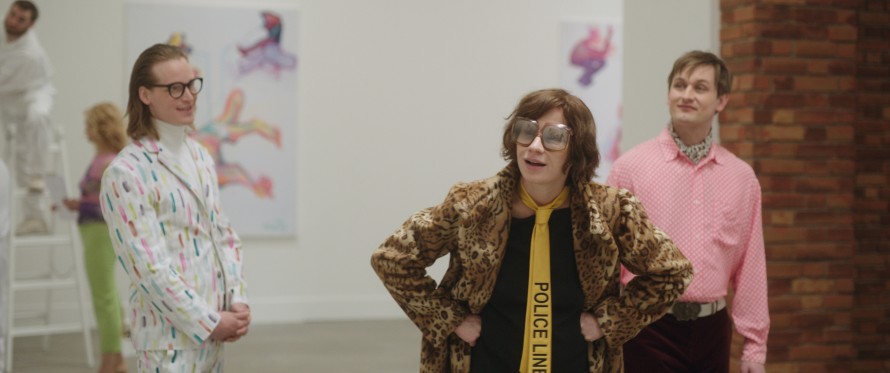
Saladin Dellers, Birgit Minichmayr, Lukas Watzl in Mit einem Tiger schlafen by Anja Salomonowitz
The Forum Special is also focusing on the short films by the Austrian artist Maria Lassnig while the biopic Mit einem Tiger schlafen (Sleeping with a Tiger) is screening in the regular Forum programme.
Anja Salomonowitz, the director of Mit einem Tiger schlafen, really esteems Maria Lassnig whom she knows very well. Lassnig is one of the most important avant-garde artists in Austria. She also made films which gained international attention when they were screened in the Forum in the 1970s. Her fantastic cinematic animations and drawings always playfully refer to a personal biography that is failing to get off the ground. They’re about a woman’s career in the midst of a man’s world, about biological sex and gender, about sex, about being creative as a woman.
Mit einem Tiger schlafen is a biopic but also an unusual film. Birgit Minichmayr plays Maria Lassnig at all ages, including as a child and in old age. The film embraces the dual perspective of inside and out that is so central to Maria Lassnig’s work: she looks at herself from the outside, at her body and at herself as an object.
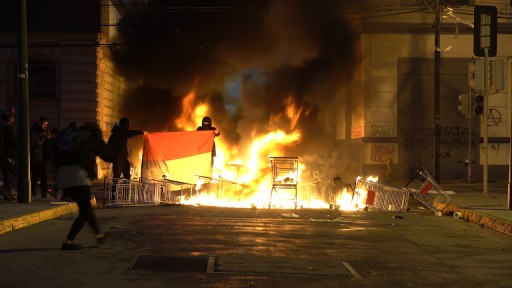
Oasis by Tamara Uribe and Felipe Morgado
You have given the Forum Special the title “Relations & Resistance”. The implication is that there is something resistant about looking at repressed history – which bears a certain topicality.
I believe there’s something inherently resistant about undertaking a precise, honest examination of the past today, about grappling with a greater complexity and the revision of ideological content that has not yet been completely elucidated or “cleared up”. In this respect, I would define many of our films as political. But there are two documentaries that are very obviously so: the images in Intercepted by Oksana Karpovych show the destroyed cities and streets in Ukraine while, on the soundtrack, you can hear telephone conversations between Russian soldiers and their wives or mothers which have been intercepted by the Ukrainian security services. It becomes clear that these men have not simply been forced into war by Putin – they are people who are deliberately looting and killing.
We also have Oasis by Tamara Uribe and Felipe Morgado. This is a complex film about the nationwide protests in Chile in 2019. A new constitution was supposed to be brought into being, which ultimately failed. The directing duo films the demonstrators without any comment or contextualisation. As a result, it’s never made explicit who is speaking or whether it is a left-wing or right-wing discourse. The film is about politics as a process of negotiation; it asks about how much protest democracy needs and how much democratic potential there is in protest.
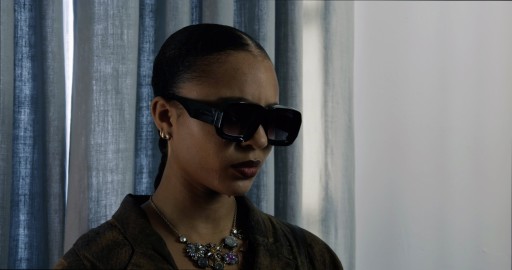
Ashby Bland in The Wrong Movie by Keren Cytter
Do you mean to encourage non-violent resistance with this programme?
I don’t think that we’re ultimately compiling a guidebook with our film programme. But if the attitudes that we developed together while we were selecting and discussing the films can be carried forward into the audience’s reception of them, that would be great. Everything starts with the films, they are at the centre of it all.
This year’s films in the Forum focus a great deal on women and their relationships with one another. In general, you have fewer films by men in your programme. However, men are still over-represented in the mainstream. Does your programme show that things can be done differently?
On the one hand, of course I consider it important to look at who is behind the camera or the film right from the start. On the other, I have to admit that this becomes quite difficult once the size of the production passes a certain level. The great thing about the Forum is that we don’t have to consider whether the films have high budgets and are big or flashy. For us, it’s always about looking at independent filmmaking, too, not the box office. But when it comes to feature films of a certain size and with a bigger budget, the air grows thin for women directors (with the exception of documentaries). That is something that can be observed and proven, and we festival makers have to take action against this as do the film funders. That’s why we found it important not only to invite female directors back whose films have previously screened here – such as Lola Arias with Reas and Anja Salomonowitz – but also female filmmakers who may be new to the Forum but who have already made a number of films and are experienced, such as Costanza Quatriglio, Eva C. Heldmann and Keren Cytter, although her work already featured in Forum Expanded.
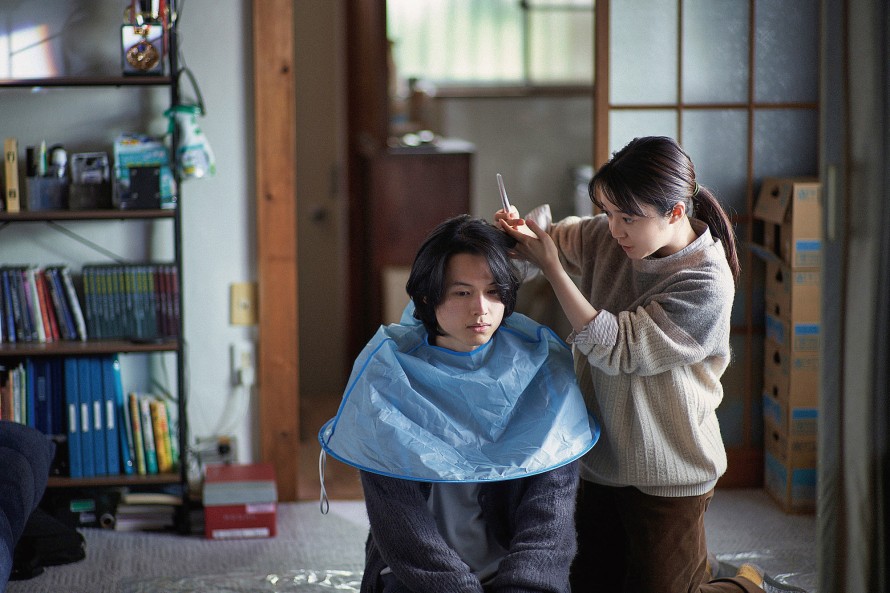
Hokuto Matsumura and Mone Kamishiraishi in Yoake no subete by Shô Miyake
Are there films in the programme that people might not necessarily expect to see in the Forum?
We have a few films in the Forum of which it will certainly be said – at least, I’m hoping so – that they could have been shown in another section. Shô Miyake, for example, was in the Forum with his debut film. He then had a film in Encounters but he’s now back in the Forum with Yoake no subete (All the Long Nights). This is an extremely poetic film about two workers: she has constant PMS and he has panic attacks. Basically, they’re two losers of an industrialised burnout society who grow closer to each other. They develop an intimacy without it becoming a romantic love story.
Săptămâna Mare is another film that, at first glance, seems to be atypical of a Forum film due to its narrative and dramaturgical unity. The Romanian director Andrei Cohn has filmed the adaptation of a novella set shortly before 1900, during Passover. It’s about the Jewish landlord of an inn where all the denominations and ethnic groups in a village come together, but where tensions between Christians and Jews gradually grow. The film is essentially a fascinating psychological analysis of how violence, anti-Semitism and racism work and the effect they have on people.
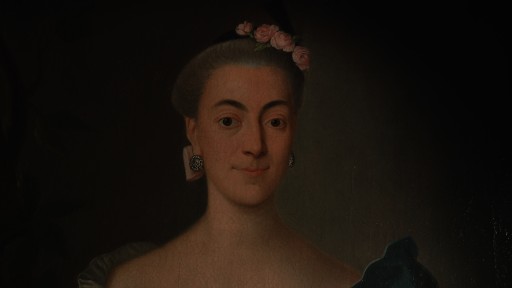
Portrait Catharina Helena Dörrien in Ihre ergebenste Fräulein by Eva C. Heldmann
Is there a film in the programme that lies particularly close to your heart?
Ihre ergebenste Fräulein (Well Ordered Nature) by Eva C. Heldmann is one of my favourite films this year. It’s an essay film expressed in the wonderful language of the 18th century that tells the biography of the now forgotten botanist and educator Catharina Helena Dörrien. Her life is placed in the context of the Enlightenment and the social norms of the time. The language is really special – and the freedom that the filmed flowers express in this film. I find it very uplifting.
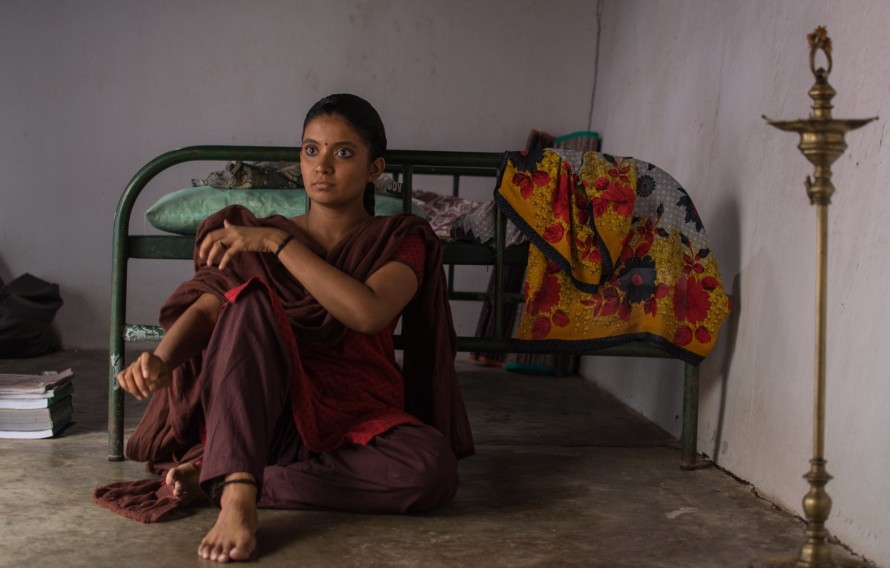
Anna Ben in Kottukkaali by Vinothraj PS
Is the Forum a particularly political section?
The Forum asks what a political film actually is, what form it might take, and how complex the question of form and content is. This year, we’re showing films that you won’t notice at first glance are actually extremely political. Kottukkaali (The Adamant Girl) by Vinothraj PS, for example. It’s a feminist film that depicts a misogynist, patriarchal society, but in the guise of a road movie.
Or La piel en primavera (Skin in Spring) by Yennifer Uribe Alzate, which comes across as a harmless arthouse movie because it’s about a single mother who rediscovers herself and her body. But at the same time, it reveals this woman’s emancipation as an inner transformation – in the midst of her everyday life.
Oasis of Now by Chee Sum Chia is different in form – it’s very stately and beautiful – but it also puts a woman at the centre of things. She’s a Vietnamese migrant in Malaysia who speaks five languages as a matter of course. She cleans and mops and takes care of children and the elderly. It was important to us that the programme has a strong connection to lived realities and isn’t just about our privileged bubble here in Berlin.
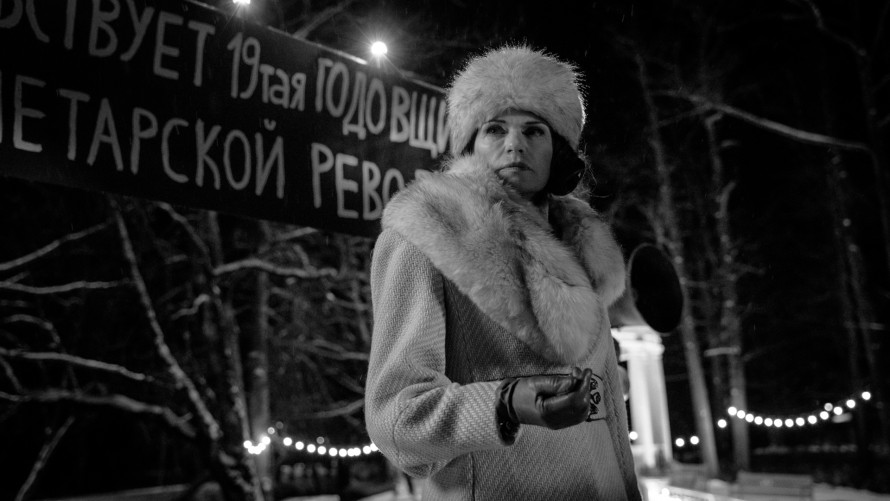
Olga Šepicka-Slapjuma in Marijas klusums by Dāvis Sīmanis
What sets this edition of the Forum apart?
This year, in my opinion, the Forum is defined by the fact that the films stand on their own and yet also come together to form a coherent programme that exhibits a distinct attitude. We have opened things up but, at the same time, small documentary films still have a place here. There are a total of 30 films from 32 production countries in the main programme. This indicates a certain breadth and size that I consider important. Now we’re hoping that our own enthusiasm will spread to the audience. I’m really looking forward to this edition!
By the way: in-depth interviews with the filmmakers and further information about the Forum films can be found on the Arsenal website!